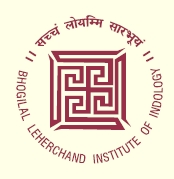
Bhogilal Leherchand Institute of Indology
38th Meeting of Monthly Study Circle, BLII on Saturday, 11th July 2009 -
on Saturday 11th July 2009 at 11.00 A.M.
On this occasion Prof. Shashi Tiwari (Maitreyi College, University of Delhi & General Secretary, WAVES, India) will deliver a Power Point Presentation on Origin of Environmental Science from Vedas.
Prof. Usha Chowdhary, Recipient of President Award (Former Professor, University of Delhi) will preside over the event.
You are requested to kindly attend this lecture with your family and friends. The function will be followed by Lunch.
Please confirm your participation over the phone or by e-mail to the undersigned for the better arrangements and oblige.
Origin of Environmental Science from Vedas
(A Powerpoint presentation)
by

Prof. Shashi Tiwari,
Maitreyi College, University of Delhi, Delhi
Synopsis of Paper
The Vedas are the first texts in the library of mankind. They cover knowledge both physical and spiritual. The tripartite model of knowledge at the basis of the hymns helps in their meanings. Generally indication of most of the scientific principles is there in their earliest forms. In recent days, environmental science is a discipline of modern science, but we find its various aspects discussed in the Vedic literature. Vedic vision on environment is well-defined in one verse of the Atharvaveda where three coverings of our surroundings are referred as Chandansi (AV 18.1.17).
Vedic Aryans studied nature’s drama very minutely. They realized instinctively that action, movement, creation, change and destruction in nature are the results of forces beyond men’s control. Natural aspects or energies are glorified by the Vedic seers as deities. Yaska has classified these Gods among three groups i.e. upper, middle and lower according to the division of the universe. Rita is the name given to Cosmic Law which governs every thing in the universe. Varuna is depicted as the Lord of this universal order.
The Bhumisukta of Atharvaveda (12.1) denotes environmental consciousness of Vedic people especially in reference to earth. The hymn talks about the different energies which are generated from the body of the earth. According to Rig-Veda (7.49.2) water as a part of human environment occurs in five forms - Divyah, Sravanti, Khanitrimah, Svayamjah, Samudrarthah. Vedic verses also describe characteristics and significance of air for living beings. Animals and birds are regarded as a natural part of human environment. Oshadhi Sukta of Rig-veda (10.97) addresses to plants and vegetables as mother. Here Aranyani Sukta(10.146) prays for the protection of forests. The concept of Vedic sacrifice (Yajya) seems to be a major principle of environmental science in its broader sense. It signifies the theory of give and take for production and maintenance in this world. The importance of coordination between all natural powers is expressed in the Shanti Mantra of Yajurveda(36.17).. The Vedic view to live in harmony with environment was not merely physical but was far wider and much comprehensive.
About Prof. Shashi Tiwari
Prof. Shashi Tiwari, presently working in the Department of Sanskrit, Maitreyi College, University of Delhi is engaged in Sanskrit studies and Vedic research for the last forty years. She has also worked as Visiting Professor of Basic Hindu Scriptures in the Hindu University, Orlando, USA. She has participated in several International conferences on Vedas and Sanskrit held in USA, Canada, Italy and Nepal along with conferences held at different parts of India. She has herself organized about fifty academic programs and twelve national conferences in India and Nepal on Vedas and ancient heritage as the General Secretary of WAVES, India.
Dr..Tiwari has twenty published books to her credit, apart from more than 125 research papers published in journals or books and about 150 talks broadcasted from All India Radio. She has been honored with eleven academic awards from various Academies of India including the prestigious honour “Sanskrit Sahitya Seva Sammana”,2006 from the Delhi Sanskrit Academy for her contributions to Vedic and Sanskrit Studies.